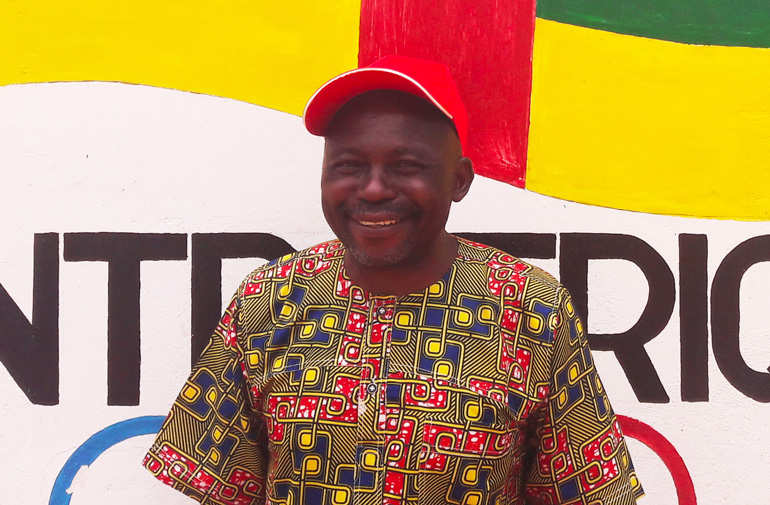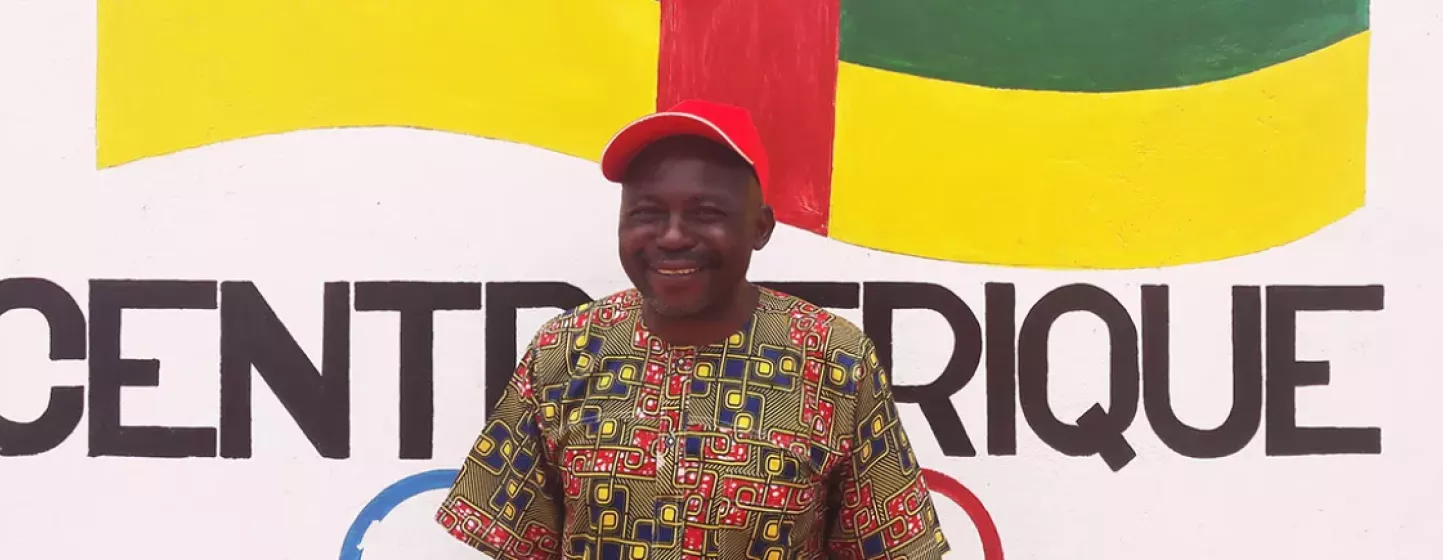Jean-Ignace Manengou JIM – serving Humanity in many different ways
Media, spirituality, agriculture... Jean-Ignace Manengou (JIM), a 59 year old from the Central African Republic, has a variety of passions. Meeting with the humanist former president and founder of the Association of Community Radio Stations in the Central African Republic. Profiled by Emmanuel de Solère Stintzy.
A big burst of laughter and an energetic handshake. With Jean-Ignace Manengou, “JIM the magician”, the years spent apart from one another melt away as if you had just seen each other yesterday... With a mischievous smile, the man in the field recalls: “My parents were farmers and livestock breeders. My father always said that ‘the earth is our mother!’ As a child, I was working fields that matched my size, but I realised that we could build our life on agriculture”.
However, the young JIM initially appeared to go down two different routes: “In high school, our geography and history teacher launched a magazine, ‘Jeunesse curieuse’ [Curious Youth], which pushed us to improve the way in which we expressed ourselves in writing”. After finishing his exams, he entered the major seminary, helped to create a quarterly journal, learnt catechism by means of audio-visual tools and piqued the curiosity of his bishop, Michel Maitre, a Frenchman: “A priest who is also a journalist? What should I do with him? Let’s create a radio station!”
Ordained as a priest in 1991, Jean-Ignace Manengou took his bishop at his word the following year and obtained a small studio and equipment from him for the diocese of Bambari. Having been in charge of this radio station until 1998, he then spent three years in Abidjan, where he achieved a Master’s degree in journalism at the Institut supérieur de communication [Higher Institute of Communication].
Radio “to take charge of his own destiny”
In the years that followed his appointment to the position of head of Catholic media in Bangui in 2004, JIM was approached by several donors. Bernard Chenuaud, then director and head of international media support projects at RFI recalls: “He was dynamic, joyful and very straightforward; however, he was experiencing some difficulties with organisation, administration and management”. Sahadou Ali Zato, a trainer from Benin who has known Jean-Ignace Manengou for the same amount of time confirms: “He will run in every direction to try and please everyone. He is creative and is always thinking of new ways to make it easier for community radio in disadvantaged areas”.
The increase in these stations gave rise to the idea of an umbrella organisation, independent from the Catholic Church. The Association of Community Radio Stations in the Central African Republic (ARC) was created in 2009. JIM, who acted as its president and founder until 2019 recalls: “Back then, we only had radio stations in the western and central areas. The rest of the country had no radio coverage. A radio station provides information and allows communities to take charge of their own development and destiny”. Within ten years, under the leadership of its energetic president and founder, the number of community radio stations doubled, increasing from fourteen to around thirty (41 today).
Don’t get JIM started on the social utility of radio stations. He will tell you about the Séléka (armed group) chiefs who forced a thief to return equipment stolen from the community radio station in Bria: “I also remember a mission in Bossangoa to relaunch a different radio station. Neighbourhood leaders over the age of 70 came along, each with their own equipment, to clean the radio station. They explained that when this station was running, they never had any problems with one another”.
Return to the land
In this context, CFI’s Recovery and Stabilisation project (2016-2019) presented an opportunity: “It massively boosted the skills of the radio stations and ARC: management, association management, journalism. It also strengthened the team spirit at each radio station and between different radio stations, giving rise to the idea of shared destinies between them.”
These days, JIM is still at the service of others; he has been providing support to HIV-positive people since the 1990s and wants to create a committee for the protection of media professionals in the Central African Republic in the near future: “a dozen journalists have been killed in the last twenty years without any investigation ever having taken place. As for our retired colleagues, they are out there practically begging for money...”
Another project that is close to his heart is returning to the land with an agricultural centre in Yombo, a village 27 km from Bangui on the road to Mbaïki. “We do a lot of testing with the young people on the team: soya, onions, papaya jam, etc. We would love to turn this area into a proper training centre with a small radio station to share techniques and information about agriculture and the rural world”, concludes JIM, now more than ever an all-terrain humanist at the service of his neighbours.
In 10 years...
What will Jean-Ignace Manengou be doing in 10 years? It’s difficult to guess given that he is a “box full of good ideas” in the words of Richard Goutia. The technical directorof the Réseau des Médias Communautaires de Centrafrique [Community-based Media Network in Central Africa] (RMCC) continues: “I imagine JIM will be on his farm, as I feel like he is moving away from the media world”. Bernard Chenuaud, former Africa Deputy Director at CFI, a man who has known JIM for around twenty years, is less sure: “Jean-Ignace likes growing things and seeing how they change: agricultural training centre for young people? New radio station?” Sahadou Ali Zato, a trainer from Benin who is also a friend of JIM has advised him to “surround himself with project management or accounting students to manage his paperwork so that he, as a great dreamer, can concentrate on those dreams.” And what does the man himself say? “I don’t know what my physical fitness will be like ten years from now, but I can see myself spending my life in the shade of the fruit trees that I will have planted. I would like to help young people to find work at the agricultural centre. With a small radio station to produce broadcasts to share with communities and other stations”.

